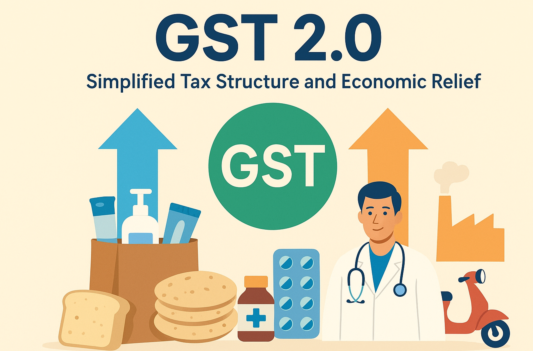GST 2.0
Tax ammendments tax ammenmentsPosted by Kalaiselvi on 2025-10-28 09:23:31 |
Share: Facebook | Twitter | Whatsapp | Linkedin Visits: 195

India’s
GST 2.0 reform is a major restructuring of the Goods and Services Tax system
aimed at simplifying taxation and improving affordability. The new system
introduces a two-slab model of 5% and 18%, along with a special 40% rate for
luxury and demerit goods. This marks a major shift toward a simpler, fairer,
and growth-driven tax regime.
Taxes on
essential goods like soaps, toothpaste, and Indian breads are now reduced to 5%
or fully exempt, helping families manage their living costs better. Healthcare
benefits as well — taxes on essential medicines and life-saving drugs drop from
12% to Nil or 5%, making treatment more affordable.
Middle-class
consumers gain relief through lower taxes on two-wheelers, small cars, TVs, air
conditioners, and cement. These cuts promote spending and support the
automobile, electronics, and construction sectors. In agriculture, GST on farm
machinery and irrigation tools is reduced from 12% to 5%, cutting farming costs
and boosting productivity.
Luxury
and harmful products such as tobacco, pan masala, and aerated drinks now face a
40% GST. This balances revenue while discouraging excess consumption.
Overall,
GST 2.0 promotes simplification, affordability, and transparency. It reduces
compliance pressure for businesses, prevents disputes, and encourages
industrial growth. The reform benefits both consumers and producers while
supporting India’s economic progress.
Takeaway;
ITP regularly conducts public events with sponsorships and merchandise to raise
awareness about GST 2.0, road safety, and environmental issues, while
submitting public petitions to authorities to promote responsible citizenship.
Search
Recent News
- Capital Gains on the Sale of Property
- Global lobbying groups call for delay to India's new digital tax
- Inquiry against 50 IRS officers over suggesting tax hike for the rich: Report
- New versus old tax regime: Analyse the benefits before making a c
- From changing growth metrics to revising debt targets
- Cost inflation index for FY 2020-21
- The Essential Commodities (Amendment) Ordinance, 2020
- Contracting GDP!